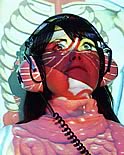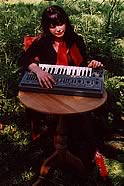Large Number : Ann Shenton |
| Jump to page: | |
cc: How did you learn to fix your Moog and Theremin? AS: I taught myself to fix gear. Only trouble is now I get soldering irons for my birthday. cc: Your Theremin has been "beaten up and smashed up so many times." Are you like Jimi Hendrix on stage or something? AS: The reason the Theremin has been smashed up so much is the fault of the audience; they get hold of it sometimes. I don't believe in mindless wrecking of instruments although some members of Add N To (X) did.
AS: The first electronic sounds I heard were after I had an operation on my Britney Spears and they made me listen to bleeps for hours on end to test my hearing. Then I listened to Dr Who, then sci-fi soundtracks - the usual curve. cc: Do you think the early hearing problems made you appreciate sounds more than most - which is why you enjoy creating and recording so much now? AS: I think that the early problems I had with hearing made me panicky about not getting enough sound, so I became obsessive and stole batteries to fuel my cassette player in case it ever ran out. I took it everywhere. My alcoholic dad got me a pony to keep me quiet and I would go riding with cassette player stuffed into my cagoule pouch blaring out Queen's A Day At The Races. The local kids called me gypsy and chucked bangers at me and my pony - but I am not bitter. cc: You mix electronics and 'traditional' instruments to great effect. Will you ever create a totally electronic (or totally traditional) album? AS: I don't believe in separating or classifying instruments into working groups - I am not Darwin, I am trying to make music here. It was strict in Add N To (X); Steve got a Steinberg bass and Barry was livid as we were supposed to be synthesiser puritans. It was like a bleeding religion. cc: Classifying instruments into working groups is, as you say, bad news. Sticking rigidly to the expectations of genre - metal or blues or whatever - is a far worse crime, wouldn't you agree? AS: Sticking to a classified, recognised genre makes things easier for record labels and lazy journos. cc: Here's the big issue question: You seem to be well into the concept of man/machine. Is it sensible to create machines that can think and learn, like the neural network programs? Are they the next step in man's evolution? AS: Artificial Neural Networks are called ANNs for short. Thinking and learning machines are nothing to be afraid of. We are scare-mongered by 2001: A Space Odyssey, Demon Seed and Frankenstein. Most of these 'machines' are just computer programs/pattern recognition, oil spillage/wind speed prediction programs, not the big black shiny evil thinking super brain rapist robot. cc: You said in another interview that robot voices piss you off. What about Kraftwerk? They are loaded with them. AS: I don't hate vocoders; it's just when everyone is harping on about them I turn off. The whole 'I am your robot lover, autobahn, la la la, orgasm electric' has become a pastiche. cc: When you joined up with the Brother Speed bike gang in Idaho did you learn anything from the experience? AS: I have to be careful what I say about them. I learnt how to say thank you to a bandito biker when he threw a cig on the floor for me, I learnt how to cling on like a limpet to the back of a Harley, to drink Knob Creek from a jar while rocking to and fro in a chair, to tan a hide, to keep quiet and to shoot. cc: Sounds like a tense time . . .
cc: Idaho is surrounded by desert isn't it? That's a world apart from Windsor, Suffolk or Somerset. Are you a woman of many contrasts? AS: I try to avoid being in the same place for too long - avoid predictable people. Idaho was too far away from the sea. I would wake up in the middle of the night petrified and for the first time in my life I longed for England. But I don't only desire the countryside, the sea and English pubs. The next recording might be happening in the port of Alexandria in Egypt, or Slough. cc: Why Alexandria, and why Slough? AS: I suggested recording in Alexandria to piss [Large Number's record company] White Label off. I don't really want to go to Slough either, I was just trying to be topical. It looks like the next recording will be in Normandy as it is exactly half way between Egypt and Slough. At least that is what White Label told me. cc: [As mentioned in the track Lexical Synesthesia] Where can you get a microphone for only 99p? What a bargain! AS: The mic for 99p is from a shop in Slough. They also sell a 'gold plated' version for £1.99. I also picked up a mini synth like the one they [German syth act Trio] used for Da Da Da on Top Of The Pops for 15p at a car boot near Slough last September. :: Tom Alford |
| Jump to page: | ||||

